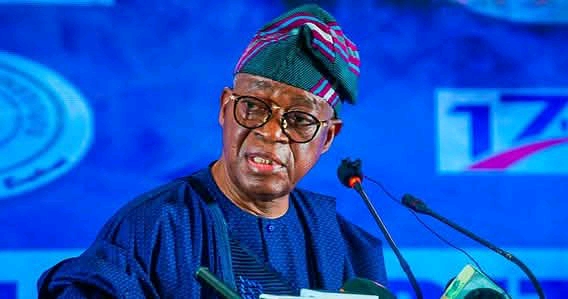From Idu Jude, Abuja
The Minister of Marine and Blue Economy, Adegboyega Oyetola, has said that the establishment of the National Coast Guard is aimed at establishing clear protocols, enforcing safety regulations, and overseeing navigation routes in Nigerian inland waterways.
The Minister remarked during a Senate public hearing on the establishment of the Nigerian Coast Guard with emphasis that it will play a critical role in safeguarding lives, property, and trade within Nigeria’s coastal and inland waterways.
Oyetola, further speaking, noted that the Coast Guard, if established, will respond rapidly to marine diseases with timely and efficient search and rescue operations.
On environmental protection, he believes the Coast Guard will actively work, in collaboration with other relevant government agencies, to prevent pollution and enforce environmental regulations within Nigerian waters.
Oyetola said, “Through initiatives focused on conservation and the protection of marine ecosystems, Nigeria will support Nigeria’s commitment to environmental stewardship, safeguarding marine biodiversity for future generations.
“It will ensure the enforcement of Civil Maritime Laws, tasked with upholding laws that govern civil maritime activities, the Coast Guard will enforce fishing laws and regulations, conventions on pollution, and other civil maritime offences.
“This function will support sustainable resource management, protect Nigeria from illegal offences, and align with international best practices for civil maritime Nigerian Collaboration with Military/Paramilitary agencies.”
While commending the efforts of the Nigerian Navy on its achievements in safeguarding the Nigerian maritime space and giving Nigeria a good image worldwide, said that its collaborative effort with the Ministry of Marine and Blue Economy and its agency, the Nigerian Maritime Administration and Safety Agency (NIMASA) in the Deep Blue Project has shown great results with zero piracy in Nigeria’s territorial water in the last three years.
However, he said, there is a need for results to complement the efforts the Navy made as it is done in other climes.
“According to a 2009 publication by the Africa Centre for Strategic Studies, 15 out of the 21 independent maritime nations in sub-Saharan Africa have dedicated coast guards that identify themselves as such, and none has our population, and many of these countries do not have the length of our inland waterways or coastline.
“Also, a 2015 communication by the Institute for Security Studies of the National Defence College of Nigeria highlighted the impact of activities such as illegal, unregulated, and unreported fishing in the inland waters, coastal, and marine fishing zones in sub-Saharan Africa, which is estimated to cost the region approximately between US$ 3 billion to US one billion a year in lost revenue.”
Meanwhile, the Minister has assumed that the Lagos-Calabar Coastal Highway development is a major game changer for the entire coastline of the country, which should enjoy better security from the Coast Guard.
“The project is expected to unlock the region’s blue economy potential. Hotels, beach resorts, water parks, eco-parks, ferry services, hospitality regions, industrial potentials, and more are soon to spring up along the coastline.
“This increase in economic activities will require a dedication that will be responsible for ensuring maritime safety, search and rescue, environmental protection, and the enforcement of civil maritime laws.
“The spate of boat mishaps on our inland waterways is also a strong justification for the need to strengthen our maritime industry and enforcement of maritime laws and regulations in the inland waterways. This is necessary to boost maritime trade and transshipment in Nigeria.
“Also, considering Nigeria’s critical position in the maritime domain on the continent and globally, the establishment of a National Coast Guard would further increase our standing in the comity of maritime nations. This will no doubt attract foreign support and assistance.”
While declaring the public hearing open, the President of the Senate, Senator Goodwill Akpabio, thumbed up the bill, which has passed its second reading, with an emphasis that it is a necessity, not a need.
Senator Akpabio, who was represented at the public hearing by Senator Akintunde Yunus, said that the power to establish a similar military outfit is exclusively the right of the law-making organ of the government of Nigeria.
Senator Akpabio said that Senator Wasiu Eshinlokun’s sponsored bill is timely as it has come to ensure the Nigerian waterways of criminal activities with increased revenue.
“We are not here to discuss the sponsored bill but to discuss the safety of our maritime industry and the marine economy in general.”
In his welcome address, the Chairman of the Committee, Senator Wasiu Eshinlokun, stated that the World Over has reasons for the establishment of Coast Guards to complement the Navy. He said that the country has a vast land mass that needs to be covered against marine theft and external aggression.
Reacting negatively, the Chief of Naval Staff, Vice Admiral Emmanuel Ikechukwu Ogalla, opposed the bill, which it views lacks military impute, before its presentation to the public.
Vice Admiral Ogalla, who was represented by Rear Admiral Olusegun E. Ferreira, said that the Coast Guard, if established, remains a duplication of functions that did not take into consideration the security architecture before making it public.
“There is no need for the establishment of a Coast Guard; this is because there is no clear distinction between the Nigerian Navy and the upcoming Coast Guard. This will bring division in the Armed forces.”
Senator Adams Oshiohmole, while speaking in corroboration with the Navy, asserted that the country is fairly in duplicating agencies that perform similar duties. The former Governor of Edo State argued that the establishment of a Coast Guard, if not well-checked, could be a waste of meagre resources.
“To me, there is no economic value in establishing another military outfit. The country should focus on maintaining and equipping the Navy for optimal performance and not putting up another outfit with separate financing.”
